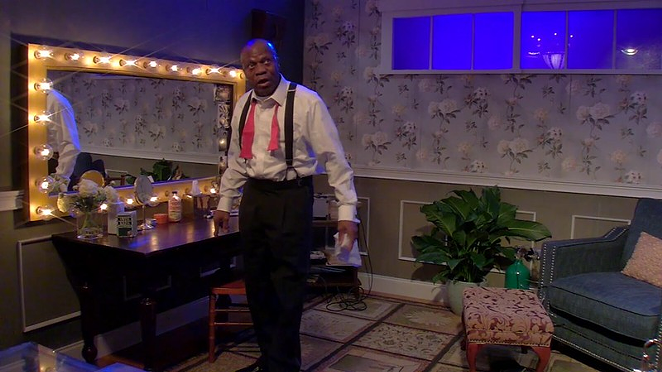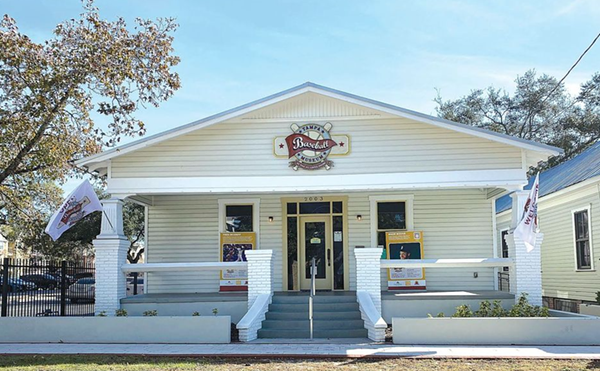As we approach the first anniversary of COVID-19 descending upon Florida and closing our theaters, I’m grateful. Without the necessity of theater to produce digital content for survival, we might never have had the luxury of seeing L. Peter Callender as Louis Armstrong. A one-person show is not by definition inherently dramatic, so the performer at the core of a play where one is forced to go solo better be interesting.
When an actor is asked to portray an icon, it also presents a particular challenge. Audiences know the quirks that make a unique artist memorable. American Stage already struck gold once with Janis Stevens’ remarkable embodiment of Kate Hepburn and now we have an unforgettable Satchmo in Mr. Callender. Playwright Terry Teachout, who is better known as the long time theatre critic for the Wall Street Journal, has given an actor the opportunity to demonstrate that he’s a virtuoso.
Satchmo at the Waldorf
American Stage Digital Theatre
$15, through Feb. 28
727-823-PLAY (7529); americanstage.org
You see, in addition to embodying Louis Armstrong, Callender also brings to life his cynical thug of a manager, Joe Glaser, a white Jewish New Yorker, who is a protege of Al Capone and a bit of a father figure for the abandoned Louis. The transition is striking. The lights in Armstrong’s dressing room at the Waldorf Astoria go black, and suddenly designer Chris Baldwin’s only illumination is a high angle white light reminiscent of a film noir interrogation. Glaser goes full Lenny Bruce using words that got the comic arrested. However, his eyes gleam with delight as he shares the power of his coarseness. “People don’t expect you to talk like that in an office on Park Avenue.”
We’ve already forgotten that the gentleman dictating his reminiscences into an old school cardioid microphone before his dressing room mirror is the embodiment of jazz. Calendar effortlessly captures Armstrong’s distinctive gravelly voice, infectious laugh and winning smile. Louis has tales to tell—about his rise from poverty, Dizzy Gillespie, Ike’s cowardice in the face of integration, shocking revelations of extortion and other unexpected betrayals that pepper the play with expletives; they’re not gratuitous, but they are plentiful.
American Stage's Director of Production Jerid Fox delivers his usual attention to detail to evoke a comfortable dressing room backstage at the Waldorf’s Empire Room: clearstory windows with mid-century floral wallpaper above a chair rail, a costume rack for some stage business, upholstered ottoman with Queen Anne legs, a plush chair with parallel nail tracks and a large Hollywood makeup mirror above the table. Director Ted Lange, of “Love Boat” fame but Shakespearean training, delivers variety in the visuals and the play’s emotional core; he uses the mirror to great effect with Louis facing the glass, but his reflection addressing the camera directly. As the reel-to-reel tape spins to record Armstrong’s thoughts, it’s brought into closeup as a transition device. The story unfolds with great clarity, even though Glaser is seen in flashbacks.
The action is set in 1971 as Armstrong is performing what will turn out to be his last concerts just four months before his death; He’s not a well man, but he’s still universally acclaimed as American music’s Bach, Dante, or Shakespeare. Wynton Marsalis credits Armstrong’s playing with “the deepest human feeling in the highest level of musical sophistication. A rare occurrence in the history of music.” Louis coined the term “cat” which remains even today in the jazz vernacular. He also invented scatting, which flourished with Ella Fitzgerald and was appropriated by Bing Crosby, whom Louis acknowledges as the greatest singer of the time.
Introducing Glaser as a character, gives Teachout an antagonist needed to balance the drama. Conveniently, he’s an exploitative presence reminding us of the blatant racism that was just accepted for most of Armstrong’s life. Imagine being an artist of Louis’ supreme gifts and hailed by all, but still being denied access to necessities. Just by virtue of his skin, he’s forced to “eat on the bus and pee in the bushes.” Even after LBJ’s Civil Rights Act while performing at the Waldorf, this giant of jazz looks out over full houses and sees no one who looks like him. “It’s all white like Ivory soap; it looks like a carton of eggs out there.” Even so, he’s able to ride a cover of “Hello Dolly” to top John, Paul, George and Ringo on the Billboard charts.
Teachout also includes Miles Davis, the next generation trumpeter, who stood on Armstrong’s shoulders, but has disdain for his cheery “Uncle Tom” stage persona. Louis, it seems, plays to make people happy while Glaser just wants to make money. The room turns “kind of blue” with dim light and underscoring as Callender’s cadence slows and drops to Miles’ distinctive whisper. Miles resents Louis jumping around “like Jim Crow on a stick. He got to play the clown like some old time darkie afraid of being Black.”
Callender clearly understands and can channel Louis’ pain. Sadly, despite the many gains we have made as a culture, even a brilliant Black Shakespearean actor is one misunderstood traffic stop away from violence in 2021. As Louis notes “white folks ain’t naturally meaner, they just been on top too long.” Yielding power to a multicultural America is obviously a source of fear whose flames were fanned on January 6. This makes “Satchmo at the Waldorf” all too timely. Much like his awarding winning turn in “Between Riverside and Crazy,” Callender dazzles as he fully embodies three distinct souls. And for theatre aficionados, that allows us to celebrate (in the title of Armstrong’s final pop hit), “What a Wonderful World.”
Support local journalism in these crazy days. Our small but mighty team is working tirelessly to bring you up to the minute news on how Coronavirus is affecting Tampa and surrounding areas. Please consider making a one time or monthly donation to help support our staff. Every little bit helps.
Subscribe to our newsletter and follow @cl_tampabay on Twitter.




















